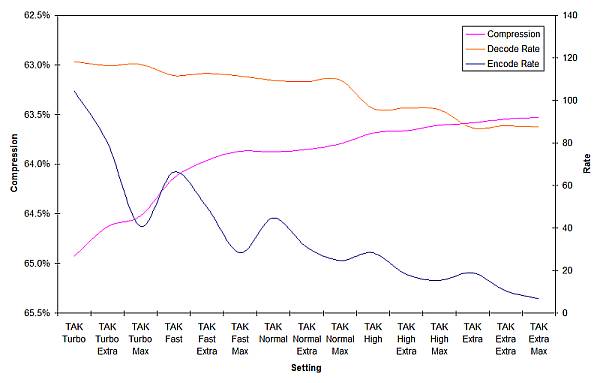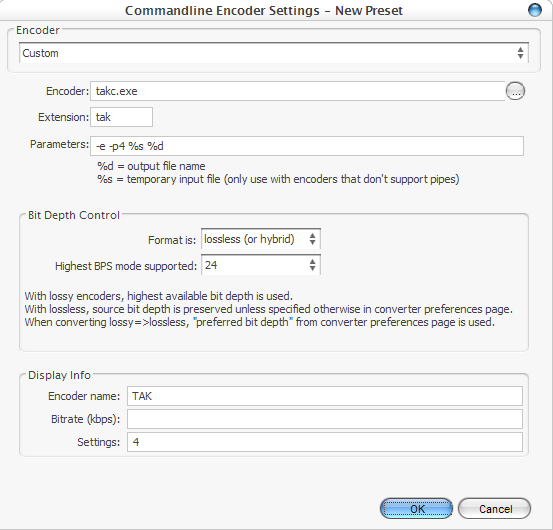TAK: Difference between revisions
m (Added 'See also' and changed forrmatting slightly.) |
Gottkaiser (talk | contribs) (changes to recommended settings and minory things) |
||
| Line 34: | Line 34: | ||
* Closed Source (at the moment) | * Closed Source (at the moment) | ||
* No hardware support | * No hardware support | ||
* Very limited software support (Only Winamp & [[Foobar2000]] plugins at the moment) | * Very limited software support (Only [[Winamp]] & [[Foobar2000]] plugins at the moment) | ||
| Line 42: | Line 42: | ||
===Software=== | ===Software=== | ||
* TAK SDK 1.0. | * TAK SDK 1.0.3 - Software Development Kit for TAK [http://www.hydrogenaudio.org/forums/index.php?showtopic=54159 here] | ||
* Winamp Plugin 1.0.2 [http://www.hydrogenaudio.org/forums/index.php?showtopic=54159 here] | * Winamp Plugin 1.0.2 [http://www.hydrogenaudio.org/forums/index.php?showtopic=54159 here] | ||
* foo_input_tak, TAK decoder for [[Foobar2000]] [http://www.hydrogenaudio.org/forums/index.php?showtopic=54087 here] | * foo_input_tak, TAK decoder for [[Foobar2000]] [http://www.hydrogenaudio.org/forums/index.php?showtopic=54087 here] | ||
| Line 50: | Line 49: | ||
==Recommended Settings== | ==Recommended Settings== | ||
* | * Default compression: "default" is the most attractive setting. (At compression levels close to [[Monkey's Audio]] High (<0.4% difference), it is able to encode more quickly.) | ||
takc -e [input file] | |||
* highest compression: "Extra" preset with "Maximum" switch. (This will create files which are comparable in size to file created using Monkey's Audio High.Decompression speed is comparable to [[WavPack]] Normal.) | |||
takc -e -p4m [input file] | takc -e -p4m [input file] | ||
* Fastest compression: "Turbo" preset (This will create files which are comparable in size to [[Monkey's Audio]] Fast or [[WavPack]] High. Decompression speed is comparable to [[FLAC]] | * Fastest compression: "Turbo" preset (This will create files which are comparable in size to [[Monkey's Audio]] Fast or [[WavPack]] High. Decompression speed is comparable to [[FLAC]] 0.) | ||
takc -e -p0 [input file] | takc -e -p0 [input file] | ||
'''TAK performance Graph''' | |||
[[Image:TAK_performance_graph.jpg|center|TAK performance Graph]] | |||
==using TAK== | |||
===TAK with Foobar2000=== | |||
* Copy the takc.exe to your [[foobar2000]] directory | |||
* Go to File -> Preferences -> Tools -> Converter | |||
* Set it up as shown: | |||
[[Image:tak.PNG|frame|center|TAK Encoder with Foobar]] | [[Image:tak.PNG|frame|center|TAK Encoder with Foobar]] | ||
NOTE: replace the -p4 with the desired compression level. | NOTE: replace the -p4 with the desired compression level. | ||
* Use [[APEv2_specification|APEv2]] tagging (will be used as internal tagging) | * Use [[APEv2_specification|APEv2]] tagging (will be used as internal tagging) | ||
===TAK with EAC=== | |||
[[EAC_and_TAK|Wiki guide to use TAK with EAC]] | |||
| Line 77: | Line 86: | ||
==Frequently asked questions== | ==Frequently asked questions== | ||
* Is the codec safe for use? | * Is the codec safe for use? | ||
Yes. To check, convert a WAVE to TAK and back and compare the two (or use foobar's bitcompare tool). | : Yes. To check, convert a WAVE to TAK and back and compare the two (or use foobar's bitcompare tool). | ||
* Why should I use TAK? | * Why should I use TAK? | ||
TAK offers high compression ratios with great decoding rates. | : TAK offers high compression ratios with great decoding rates. | ||
*What can I compress with TAK? | *What can I compress with TAK? | ||
TAK 1.0 can compress any integer-format (up to 24bits per channel) PCM Windows Waveform file (.wav). Since piping support has not been added yet, you must convert your lossless files to wav first to convert to TAK. | : TAK 1.0 can compress any integer-format (up to 24bits per channel) PCM Windows Waveform file (.wav). Since piping support has not been added yet, you must convert your lossless files to wav first to convert to TAK. | ||
*What about hardware support? | *What about hardware support? | ||
None at the moment. Although, Turbo, Fast and Normal are the candidates for hardware playback. | : None at the moment. Although, Turbo, Fast and Normal are the candidates for hardware playback. | ||
* When will the source be opened? | * When will the source be opened? | ||
Yes, TAK will be open-source, as soon as the code is ported to C or C++ and documented. However, Thomas has mentioned that he would like to improve the codec before opening the source. | : Yes, TAK will be open-source, as soon as the code is ported to C or C++ and documented. However, Thomas has mentioned that he would like to improve the codec before opening the source. | ||
Revision as of 10:03, 2 May 2007
This article is a stub. You can help the Hydrogenaudio Knowledgebase by expanding it.
| TAK | |
|---|---|
| File:TAK-logo.gif | |
| lossless audio compression. | |
| Developer(s) | Thomas Becker |
| Release | TBC |
| Type | Lossless |
| Recommended encoder | TAK v1.0.1 |
| Website | Homepage (german) |
General aspects of the format
TAK (Tom's lossless Audio Kompressor) is a lossless audio compressor which promises compression performance similar to Monkey's Audio "High" and decompression speed similar to FLAC. While the basic format is ready and safe to use, many features such as internal tagging, playback support for other players are yet to be implemented.
Features
- High compression
- Fast compression and decompression speed
- Streaming support
- Error tolerance
- Single bit error will never affect more than 250 ms
- Error detection
- Each frame protected by a 24-bit checksum (CRC)
Pros
- Fast encoding speed
- Fast decompression speed (on par with FLAC / WavPack)
- Good compression levels (on par with Monkey's Audio High)
- Error Robustness
- Fast Seeking
Cons
- Closed Source (at the moment)
- No hardware support
- Very limited software support (Only Winamp & Foobar2000 plugins at the moment)
Hardware and software that support TAK
Hardware
- None
Software
- TAK SDK 1.0.3 - Software Development Kit for TAK here
- Winamp Plugin 1.0.2 here
- foo_input_tak, TAK decoder for Foobar2000 here
- MP3tag - universal tag editor with support for TAK
Recommended Settings
- Default compression: "default" is the most attractive setting. (At compression levels close to Monkey's Audio High (<0.4% difference), it is able to encode more quickly.)
takc -e [input file]
- highest compression: "Extra" preset with "Maximum" switch. (This will create files which are comparable in size to file created using Monkey's Audio High.Decompression speed is comparable to WavPack Normal.)
takc -e -p4m [input file]
- Fastest compression: "Turbo" preset (This will create files which are comparable in size to Monkey's Audio Fast or WavPack High. Decompression speed is comparable to FLAC 0.)
takc -e -p0 [input file]
TAK performance Graph

using TAK
TAK with Foobar2000
- Copy the takc.exe to your foobar2000 directory
- Go to File -> Preferences -> Tools -> Converter
- Set it up as shown:

NOTE: replace the -p4 with the desired compression level.
- Use APEv2 tagging (will be used as internal tagging)
TAK with EAC
Wiki guide to use TAK with EAC
Future Features
- Unicode support
- Piping support
- MD5 audio checksums for verification and identification
- A German version
- Embedded cue sheets
- Embedded cover art
- Multichannel audio
Frequently asked questions
- Is the codec safe for use?
- Yes. To check, convert a WAVE to TAK and back and compare the two (or use foobar's bitcompare tool).
- Why should I use TAK?
- TAK offers high compression ratios with great decoding rates.
- What can I compress with TAK?
- TAK 1.0 can compress any integer-format (up to 24bits per channel) PCM Windows Waveform file (.wav). Since piping support has not been added yet, you must convert your lossless files to wav first to convert to TAK.
- What about hardware support?
- None at the moment. Although, Turbo, Fast and Normal are the candidates for hardware playback.
- When will the source be opened?
- Yes, TAK will be open-source, as soon as the code is ported to C or C++ and documented. However, Thomas has mentioned that he would like to improve the codec before opening the source.
